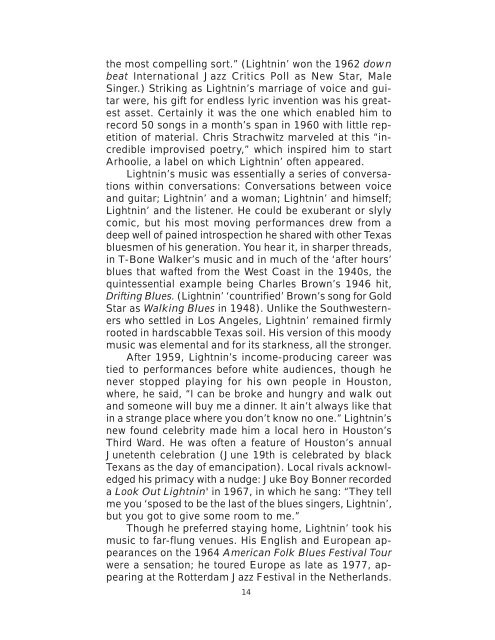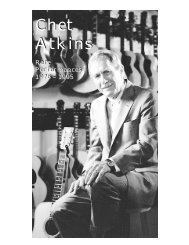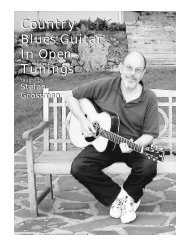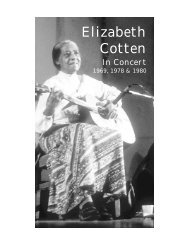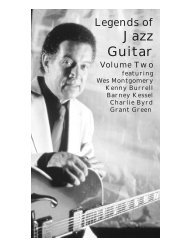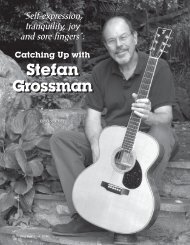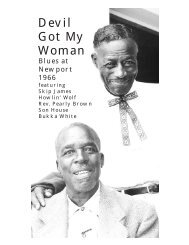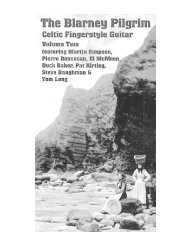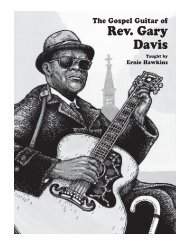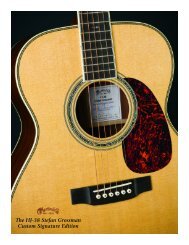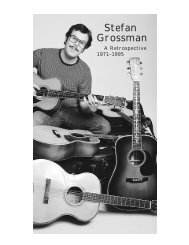Lightnin' Hopkins - Stefan Grossman's Guitar Workshop
Lightnin' Hopkins - Stefan Grossman's Guitar Workshop
Lightnin' Hopkins - Stefan Grossman's Guitar Workshop
Create successful ePaper yourself
Turn your PDF publications into a flip-book with our unique Google optimized e-Paper software.
the most compelling sort.” (Lightnin’ won the 1962 down<br />
beat International Jazz Critics Poll as New Star, Male<br />
Singer.) Striking as Lightnin’s marriage of voice and guitar<br />
were, his gift for endless lyric invention was his greatest<br />
asset. Certainly it was the one which enabled him to<br />
record 50 songs in a month’s span in 1960 with little repetition<br />
of material. Chris Strachwitz marveled at this “incredible<br />
improvised poetry,” which inspired him to start<br />
Arhoolie, a label on which Lightnin’ often appeared.<br />
Lightnin’s music was essentially a series of conversations<br />
within conversations: Conversations between voice<br />
and guitar; Lightnin’ and a woman; Lightnin’ and himself;<br />
Lightnin’ and the listener. He could be exuberant or slyly<br />
comic, but his most moving performances drew from a<br />
deep well of pained introspection he shared with other Texas<br />
bluesmen of his generation. You hear it, in sharper threads,<br />
in T-Bone Walker’s music and in much of the ‘after hours’<br />
blues that wafted from the West Coast in the 1940s, the<br />
quintessential example being Charles Brown’s 1946 hit,<br />
Drifting Blues. (Lightnin’ ‘countrified’ Brown’s song for Gold<br />
Star as Walking Blues in 1948). Unlike the Southwesterners<br />
who settled in Los Angeles, Lightnin’ remained firmly<br />
rooted in hardscabble Texas soil. His version of this moody<br />
music was elemental and for its starkness, all the stronger.<br />
After 1959, Lightnin’s income-producing career was<br />
tied to performances before white audiences, though he<br />
never stopped playing for his own people in Houston,<br />
where, he said, “I can be broke and hungry and walk out<br />
and someone will buy me a dinner. It ain’t always like that<br />
in a strange place where you don’t know no one.” Lightnin’s<br />
new found celebrity made him a local hero in Houston’s<br />
Third Ward. He was often a feature of Houston’s annual<br />
Junetenth celebration (June 19th is celebrated by black<br />
Texans as the day of emancipation). Local rivals acknowledged<br />
his primacy with a nudge: Juke Boy Bonner recorded<br />
a Look Out <strong>Lightnin'</strong> in 1967, in which he sang: “They tell<br />
me you ‘sposed to be the last of the blues singers, Lightnin’,<br />
but you got to give some room to me.”<br />
Though he preferred staying home, Lightnin’ took his<br />
music to far-flung venues. His English and European appearances<br />
on the 1964 American Folk Blues Festival Tour<br />
were a sensation; he toured Europe as late as 1977, appearing<br />
at the Rotterdam Jazz Festival in the Netherlands.<br />
14


